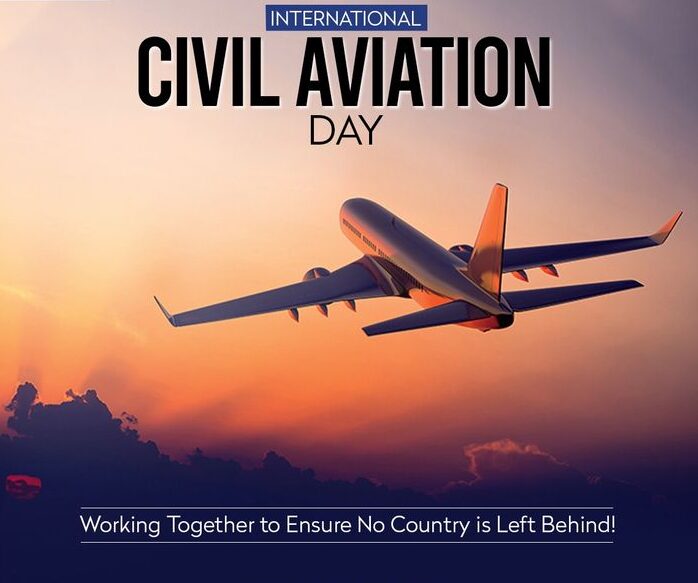“7 Powerful Reasons Why International Civil Aviation Day is Essential for Global Connectivity”
What is International Civil Aviation Day?
International Civil Aviation Day is celebrated every year on December 7 to highlight the importance of air travel in promoting global connectivity, peace, and economic development. The day also marks the establishment of the International Civil Aviation Organization (ICAO) by the United Nations. Since its inception in 1996, this day has become a vital occasion to recognize the contributions of the aviation industry to the development of modern society.
Aviation connects people and cultures, facilitates the movement of goods and services, and serves as a cornerstone of global economic progress. On this day, governments, aviation organizations, and the public reflect on the role that aviation plays in fostering cooperation and development worldwide.
History of International Civil Aviation Day
The United Nations established International Civil Aviation Day in 1996, coinciding with the 50th anniversary of the International Civil Aviation Organization (ICAO), which was founded on December 7, 1944. The ICAO was created to establish international standards for the aviation industry, ensuring the safety, efficiency, and environmental sustainability of air travel.
In 1944, the Convention on International Civil Aviation was signed in Chicago, Illinois, by 52 countries. This agreement laid the groundwork for international aviation regulation and the creation of the ICAO. The organization’s work has helped ensure that air travel is safe, affordable, and accessible, promoting cross-border collaboration and economic growth.
International Civil Aviation Day was set to commemorate these milestones and raise awareness about the critical role aviation plays in maintaining global peace, security, and prosperity.
Daily Life Impacts of International Civil Aviation Day
The significance of International Civil Aviation Day is felt every day through the benefits and impacts of air travel on our daily lives:
- Global Connectivity: Airplanes make it possible for people to travel across the globe, often in a matter of hours. This connectivity fosters cultural exchange, business relationships, and social ties, uniting people from diverse backgrounds.
- Economic Growth: Air transport is a critical driver of global trade, allowing goods, services, and commodities to be shipped across borders with speed and efficiency. The aviation industry directly and indirectly supports millions of jobs worldwide and contributes significantly to global GDP.
- Emergency and Humanitarian Aid: Air travel plays a pivotal role in disaster relief efforts, humanitarian missions, and emergency response. Humanitarian organizations and governments rely on aviation to transport supplies and personnel to areas affected by natural disasters or conflict.
- Tourism and Leisure: International Civil Aviation Day also underscores the role aviation plays in the global tourism industry. It enables millions of people to explore new destinations, creating economic opportunities for host countries and enriching individuals’ lives with new experiences.
- Environmental Sustainability: Aviation is crucial to sustainability efforts. The aviation industry has made substantial strides in improving fuel efficiency and reducing carbon emissions through technological innovation, such as sustainable aviation fuels and eco-friendly aircraft.
Key Facts About International Civil Aviation Day
Here are some important facts to understand the significance of International Civil Aviation Day:
- ICAO’s Role: The International Civil Aviation Organization (ICAO) is a specialized agency of the United Nations that sets global standards for civil aviation safety, security, and environmental responsibility. ICAO’s work ensures that air travel remains safe and accessible for all.
- Aviation’s Economic Impact: The aviation industry contributes $2.7 trillion to the global economy and supports over 65 million jobs worldwide. This includes direct employment in airlines, airports, and aviation manufacturing, as well as indirect jobs related to tourism, trade, and logistics.
- Passenger Traffic Growth: The number of air passengers worldwide has been steadily increasing. In 2019, the International Air Transport Association (IATA) reported that there were more than 4.5 billion air passengers globally, a number expected to continue rising as the global middle class expands.
- Safety Standards: One of the core functions of ICAO is ensuring the safety of air travel. Thanks to ICAO’s regulations and oversight, flying is one of the safest modes of transportation, with the accident rate continually declining.
Significance of International Civil Aviation Day
International Civil Aviation Day serves as a reminder of the many ways air travel influences our world, and why it deserves recognition and continued development:
- Promotes Peace and Security: Aviation plays an essential role in fostering international cooperation and peace. By enabling easier communication and travel between countries, aviation helps strengthen diplomatic ties and supports peacekeeping missions, making the world a more connected and secure place.
- Supports Economic Development: The aviation sector is a key driver of the global economy, facilitating trade, investment, and tourism. It directly impacts industries like manufacturing, agriculture, and technology, promoting economic growth and wealth creation.
- Sustainability and Innovation: International Civil Aviation Day provides an opportunity to discuss the environmental impacts of aviation and the steps being taken to address climate change. From investing in fuel-efficient technologies to adopting sustainable aviation fuels, the aviation industry is working towards reducing its carbon footprint.
- A Platform for Advocacy: International Civil Aviation Day is also an opportunity to advocate for improvements in aviation safety, security, and accessibility. It helps raise awareness about the need for continued investment in air transport infrastructure and for policies that ensure the growth and sustainability of the aviation industry.
How is International Civil Aviation Day Observed?
International Civil Aviation Day is observed through various activities and events organized by governments, aviation bodies, and industry stakeholders worldwide:
- Aviation Conferences and Symposia: Industry professionals and experts gather to discuss the challenges and opportunities facing the aviation industry, including sustainability, safety, and technological advancements.
- Public Awareness Campaigns: Many organizations use International Civil Aviation Day to educate the public about the importance of aviation, its economic impact, and the work of organizations like ICAO. This includes social media campaigns, workshops, and outreach activities.
- Celebratory Events: Airports, airlines, and aviation companies often hold special events, including exhibitions, airshows, and activities for aviation enthusiasts. These events help engage the public and raise awareness about the industry.
- Aviation Achievements and Awards: During International Civil Aviation Day, awards are given to organizations and individuals who have made significant contributions to the field of aviation, whether through innovation, leadership, or service.
Frequently Asked Questions (FAQs)
1. Why is International Civil Aviation Day celebrated on December 7?
December 7 was chosen because it coincides with the anniversary of the establishment of the International Civil Aviation Organization (ICAO) in 1944. The day honors the achievements and contributions of ICAO and the aviation industry.
2. How does aviation affect the environment?
Aviation does have an environmental impact, particularly in terms of carbon emissions. However, the aviation industry is actively working towards sustainability through initiatives like the development of fuel-efficient aircraft, sustainable aviation fuels, and carbon offset programs.
3. What is ICAO’s role in global aviation?
ICAO sets international standards and regulations for aviation safety, security, efficiency, and environmental sustainability. The organization’s work ensures that air travel remains safe, efficient, and accessible around the world.
Significance of International Civil Aviation Day for Society
International Civil Aviation Day is crucial because it underscores the global role of aviation in connecting the world, driving economic development, and promoting peace and security. By observing this day, society acknowledges the importance of air travel and the people who make it possible, from pilots and air traffic controllers to engineers and airport staff. It also emphasizes the need for continued innovation and sustainability in the aviation sector to ensure it remains a force for good in the future.
Wishing on International Civil Aviation Day
Here are a few thoughtful wishes for International Civil Aviation Day:
- “Happy International Civil Aviation Day! Here’s to the aviation industry for connecting people, cultures, and economies around the world.”
- “On International Civil Aviation Day, we celebrate the incredible contributions of aviation in making our world a smaller, more connected place.”
- “Wishing all those in aviation a wonderful International Civil Aviation Day! Thank you for keeping us safe, connected, and informed.”
Conclusion
International Civil Aviation Day is an essential occasion to celebrate the achievements of the aviation industry and recognize its significant impact on the world. By fostering connectivity, economic growth, and peace, aviation continues to shape our global society in profound ways. This day reminds us of the vital role air travel plays in our everyday lives and encourages us to continue working toward a more sustainable and innovative future in aviation.










